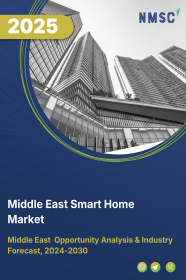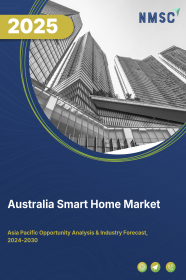
Middle East Smart Home Market by Product Type (Smart Lighting, Smart Home Security and Surveillance, Smart Entertainment, and Smart Appliances), by Communication Protocol (Wifi, Zigbee, Z-wave, Bluetooth, and Thread), by Smart Home Hubs (Standalone Hubs, and Built-in Hubs), by Voice Assistants Integration (Amazon Alexa, Goggle Assistant, Apple Siri, and Others), by Smart Home Compatibility with Smartphones (iOS, and Android), and Others – Opportunity Analysis and Industry Forecast, 2024–2030
Industry: Retail and Consumer | Publish Date: 19-May-2025 | No of Pages: 249 | No. of Tables: 189 | No. of Figures: 134 | Format: PDF | Report Code : RC2290
Middle East Smart Home Market Overview
The Middle East Smart Home Market size was valued at USD 7.97 billion in 2023, and is predicted to reach USD 31.13 billion by 2030, at a CAGR of 21.5% from 2024 to 2030. A smart home, or connected home, describes a dwelling outfitted with advanced technology and automated systems allowing for the supervision and regulation of diverse household devices, appliances, and security features via a centralized network. These intelligent devices are remotely controlled and frequently respond to voice commands or pre-established schedules, offering homeowners enhanced convenience, energy efficiency, and security. Common components found in connected homes encompass smart thermostats, lighting systems, security cameras, voice assistants, and other interconnected devices crafted to elevate the overall residential experience.
Government-Led Smart Home Promotion Projects Fuels the Market Growth
In the Middle East, encompassing the UAE, Dubai, and Saudi Arabia, government-led initiatives drive significant growth in the smart home market. These initiatives comprise incentives, tax breaks, and regulations designed to encourage homeowners to adopt connected home technologies, fostering energy efficiency, sustainability, and an improved quality of life.
Additionally, government-backed projects and collaborations with industry partners serve to demonstrate the benefits of connected homes and raise consumer awareness. For example, in September 2023, Dubai launched a competition to identify the best-connected home designs, offering prizes valued at up to one million dirhams (AED).
This competition underscores Dubai's commitment to promoting the smart home technology and innovation, motivating architects, designers, and innovators to develop cutting-edge concepts aligned with the city's vision of a technologically advanced and sustainable future.
Acting as a platform to showcase and reward creativity, the competition aims to revolutionize traditional living spaces into intelligent, interconnected homes, contributing to Dubai's broader smart city initiatives. With governments prioritizing home automation development in their urban planning and sustainability strategies, consumers increasingly embrace these technologies, driving the growth of the Middle East smart home market.
Rapid Urbanization and Technological Advancements Boosts the Market Growth
The region is experiencing rapid urbanization, particularly in urban centers such as Dubai and Abu Dhabi. This urbanization trend, coupled with advancements in technology, fuels the growth of the Middle East smart home market.
As urban populations seek convenient and efficient solutions for their homes, the demand for connected home automation appliances and systems increases. The integration of cutting-edge technologies into urban development projects further accelerates the adoption of connected home solutions in the region.
Security and Data Privacy Concerns Pose a Significant Obstacle to the Market Growth
The proliferation of interconnected systems exposes vulnerabilities, especially in smart devices such as thermostats, cameras, and door locks, making them susceptible to hacking. This vulnerability often arises from weak or easily guessed passwords and insufficient Wi-Fi network security measures.
By exploiting these weaknesses, hackers gain unauthorized access, potentially compromising residents' privacy and safety by manipulating devices or accessing sensitive data. To effectively address these risks, smart homeowners must prioritize robust password management, regularly update device firmware, and enhance their home networks' security to minimize the threat of cyber-attacks and safeguard their connected homes against potential breaches.
Integration of Blockchain Technology into Smart Home Devices Presents Lucrative Opportunities for Market Expansion
Renowned for its robust security features and transparency, blockchain technology holds vast potential to enhance the security and privacy of smart home systems. By employing encryption and secure storage, it shields sensitive connected home data, enabling users to regulate access permissions and mitigating the risk of unauthorized entry.
Blockchain technology validates device identities, ensuring that only trusted devices interact within the connected home network, and it simplifies procedures through tamper-proof smart contracts. Furthermore, blockchain technology decentralizes device control, tackles vulnerabilities, and streamlines transparent access control and permissions management.
Through the incorporation of blockchain into smart homes, security and privacy are fortified, fostering a safer and more confidential environment. Consequently, this integration is poised to create significant growth opportunities within the Middle East smart home market.
Competitive Landscape
Several market players operating in the Middle East smart home industry market include Schneider Electric, ABB Ltd, Haier lnc., Loxone Electronics GmbH, Xiaomi Corporation, Google LLC, Samsung, LG Electronics, Signify Holding, Amazon.com, Inc., Lutron Electronics Co., Inc, Sony Corporation, Resideo Technologies Inc., BSH Home Appliances Group, Johnson Controls Inc.
Middle East Smart Home Market Key Segments
By Product Type
-
Smart Lighting
-
Smart Bulbs
-
Smart Light Strips
-
Smart Switches
-
-
Smart Home Security and Surveillance
-
Smart Cameras
-
Video Doorbells
-
Smart Locks
-
Security System
-
-
Smart Entertainment
-
Smart TVs
-
Smart Speakers
-
Streaming Devices
-
-
Smart Appliances
-
Smart Refrigerators
-
Smart Ovens
-
Smart Washing Machines
-
Smart Dishwashers
-
Smart Home HVAC Management
-
Other Smart Appliances
-
By Communication Protocol
-
Wi-Fi
-
Zigbee
-
Z-wave
-
Bluetooth
-
Thread
By Smart Home Hubs
-
Standalone Hubs
-
Built-in Hubs
By Voice Assistants Integration
-
Amazon Alexa
-
Google Assistant
-
Apple Siri
-
Others
By Smart Home Compatibility with Smartphones
-
iOS
-
Android
By Installation
-
DIY Installation
-
Professional Installation
By Sales Channel
-
Online
-
E-commerce Platforms
-
Comapny websites
-
-
Offline
-
Retail Stores
-
Supermarkets and Hypermarkets
-
Speciality Stores
-
By Region
-
Middle East
-
Saudi Arabia
-
United Arab Emirates (UAE)
-
Israel
-
Qatar
-
Kuwait
-
Oman
-
Other Countries
-
Key Players
-
Schneider Electric
-
ABB Ltd
-
Haier lnc.
-
Loxone Electronics GmbH
-
Xiaomi Corporation
-
Google LLC
-
Samsung
-
LG Electronics
-
Signify Holding
-
Amazon.com, Inc.
-
Lutron Electronics Co., Inc
-
Sony Corporation
-
Resideo Technologies Inc.
-
BSH Home Appliances Group
-
Johnson Controls Inc.
REPORT SCOPE AND SEGMENTATION:
|
|
|
Market Size in 2023 |
USD 7.97 Billion |
|
Revenue Forecast in 2030 |
USD 31.13 Billion |
|
Growth Rate |
CAGR of 21.5% from 2024 to 2030 |
|
Analysis Period |
2023–2030 |
|
Base Year Considered |
2023 |
|
Forecast Period |
2024–2030 |
|
Market Size Estimation |
Billion (USD) |
|
Growth Factors |
Government initiatives boosts the market growth. Rapid urbanization and technological advancements fuel the market growth |
|
Companies Profiled |
15 |
|
Market Share |
Available for 10 companies |
|
Customization Scope |
Free customization (equivalent up to 80 working hours of analysts) after purchase. Addition or alteration to country, regional, and segment scope. |
|
Pricing and Purchase Options |
Avail customized purchase options to meet your exact research needs. |


















 Speak to Our Analyst
Speak to Our Analyst


























